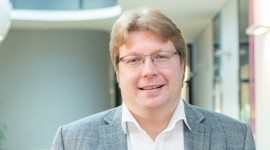REANIMA: toward a new paradigm in cardiac regeneration
Research into new endogenous mechanisms of tissue regeneration is an innovative research avenue in cardiac regeneration. This is the central goal of the REANIMA project (New‐generation cardiac therapeutic strategies directed to the activation of endogenous regenerative mechanisms), a research program coordinated by the Madrid-located Centro Nacional de Investigaciones Cardiovasculares (CNIC) and supported by €8 million funding over 5 years. The project will launch in January 2020. The Fraunhofer Institute for Cell Therapy and Immunology IZI is part of the project consortium.

Cardiovascular disease is the leading cause of death in the world. The associated heart failure is a worldwide epidemic that imposes a heavy societal burden in death, disease, and escalating economic costs and can only be resolved by heart transplantation. The inability of the human heart to regenerate myocardium lost during a heart attack is the major factor in a high proportion of cases of heart failure. To resolve this problem, the goal of REANIMA is to provide new therapies for heart regeneration.
Until now, clinical trials based on the introduction of stem cells into the heart have not shown regenerative capacity. However, studies of spontaneous and induced heart regeneration in animal models suggest that the path to progress lies in the reactivation of endogenous regenerative mechanisms. Fish and amphibians are able to regenerate their hearts, and although mammals have historically been considered to lack this capacity, regeneration was recently shown to occur in injured hearts of newborn mice. Unfortunately, in adult mammals, including humans, the heart’s residual capacity to regenerate is insufficient to recover function naturally.
REANIMA will exhaustively analyze knowledge accumulated from research in animal models in order to transform it into new regenerative therapies to resolve heart failure. The project brings together knowledge obtained from species that can regenerate their hearts (fish and amphibians), animals that cannot (adult mammals), and human heart tissues generated by tissue engineering.
REANIMA is the first Europe-wide project to integrate basic research findings in an effort to transform them into medical applications in the field of cardiac regeneration. REANIMA is funded by the European Union's Horizon 2020 research and innovation programme under grant agreement nº 874764. In addition to the Spanish CNIC, the coordinating institute, another 11 European centers participate in this innovative project: Universitaetsklinikum Hamburg-Eppendorf (Germany); King's College London (United Kingdom); University of Bern (Switzerland); Research Institute of Molecular Pathology (IMP) (Austria); Weizmann Institute of Science (Israel); Royal Netherlands Academy of Arts and Sciences (the Netherlands); Ethris GMBH (Germany); ZeClinics SL (Spain); German Primate Center (Germany); Sant’Anna School of Advanced Studies (Italy); and Fraunhofer Institute for Cell Therapy and Immunology IZI (Germany).
The Fraunhofer IZI is one of the most experienced European institutions on the translational path for Advanced Therapy Medicinal Products (ATMPs) and has a consultant activity within this project. The involvement of early consulting activities already during the development of new therapeutics allows to quickly transform protocols into the ATMP-production pipeline to ensure that newly gained knowledge is translated into clinical trials.

